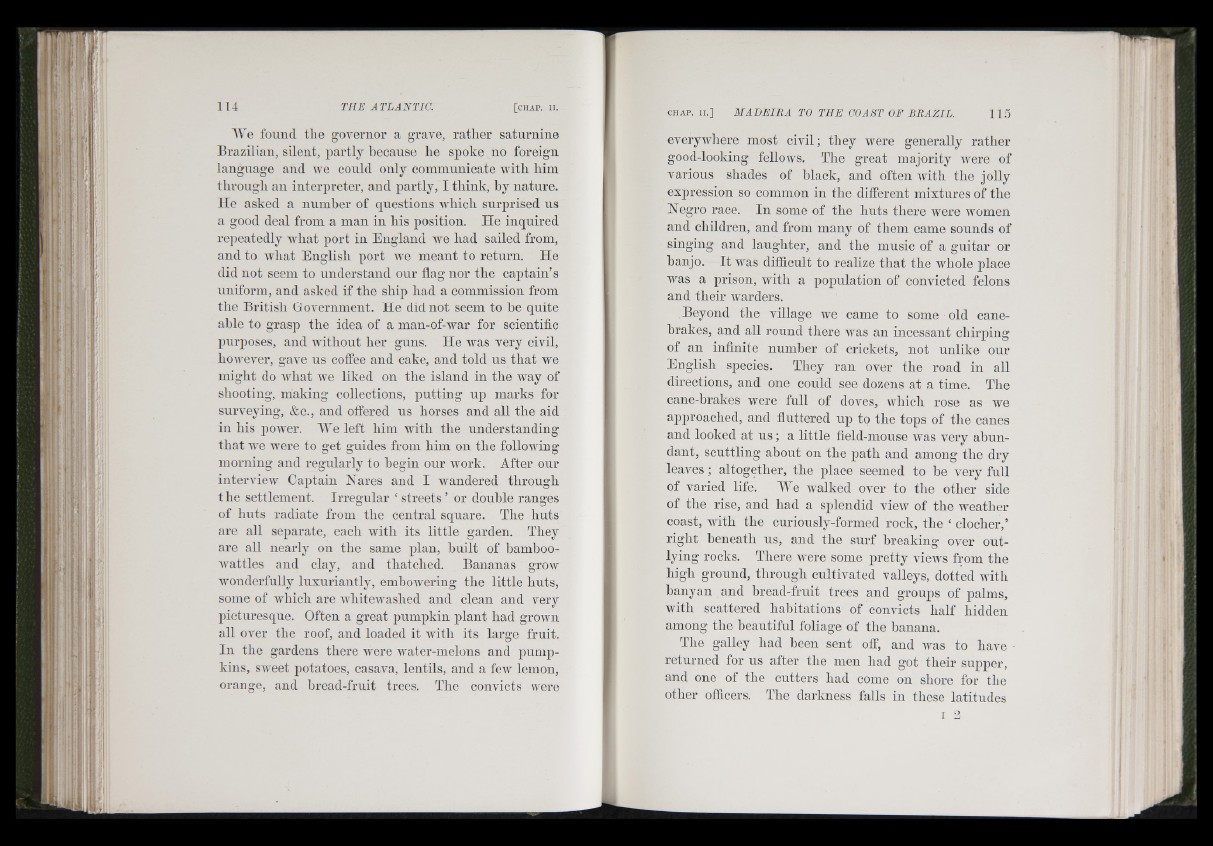
r
rk'l:T i}, |} ii:
!:•■ ii’-M
‘ ;i Tl i
'" ,il
rf!
m l
“M „ 1S5
W e found the gOA'ernor a grave, rather saturnine
Brazilian, silent, partly because he spoke no foreign
language and we could only communicate Avith him
through an interpreter, and partly, I think, hy nature.
He asked a number of questions AAdiich surprised us
a good deal from a man in his position. He inquired
repeatedly what port in England Ave had sailed from,
and to Avhat English port Ave meant to return. He
did not seem to understand our flag nor the captain’s
uniform, and asked if the ship had a commission from
the British GoA'ernnient. He did not seem to he quite
able to grasp the idea of a man-of-Avar for scientific
purposes, and without her guns. He Avas very civil,
hoAA'ever, gave us coffee and cake, and told us th a t we
might do Avliat aa'c liked on the island in the way of
shooting, making collections, p utting np marks for
surveying, &c., and offered ns horses and all the aid
in his poAver. We left him with the understanding
th a t Ave were to get guides from him on the folloAA'ing
morning and regularly to begin our AVork. After our
intervicAV Captain Nares and I wandered through
th e settlement. Irregular ‘ s tre e ts’ or double ranges
of huts radiate from the central square. The lints
are all separate, each Avith its little garden. They
are all nearly on the same plan, built of bamboo-
Avattles and clay, and thatched. Bananas grow
wonderfully luxuriantly, embowering the little huts,
some of Avhich are AvhiteAvashed and clean and very
picturesque. Often a great pumpkin plant had groAvn
all OA'er tbe roof, and loaded it Avitli its large fruit.
In tbe gardens there Avere AA'ater-melons and pumpkins,
SAA'eet potatoes, casava, lentils, and a fcAV lemon,
orange, and bread-fruit trees. The convicts vA'ero
everyAA'liere most civil; they were generally rather
good-looking fellows. The great majority Avere of
various shades of black, and often Avith the jolly
exp>ression so common in the different mixtures of the
Negro race. In some of the huts there were Avomen
and children, and from many of them came sounds of
singing and laughter, and the music of a guitar or
banjo. It was difficult to realize th a t the whole place
was a prison, with a poj)ulation of convicted felons
and their Avarders.
Beyond the village we came to some old cane-
hrakes, and all round there was an incessant chirping
of an infinite number of crickets, not unlike our
English species. They ran over the road in all
directions, and one could see dozens at a time. The
cane-brakes were full of doves, which rose as Ave
approached, and fluttered up to the tops of tlie canes
and looked at u s ; a little field-mouse Avas very ahundant,
scuttling about on the path and among the dry
leaves; altogether, the place seemed to he very full
of varied life. We walked over to the other side
of the rise, and had a splendid vicAV of the Aveatber
coast, with the curiously-formed rock, the ‘ clocher,’
right beneath us, and the surf breaking over out-
lying rocks. There Avere some pretty vicAvs from the
high ground, through cultivated valleys, dotted Avith
banyan and bread-fruit trees and groups of palms,
Avith scattered habitations of convicts half hidden
among the heautiful foliage of the banana.
The galley had been sent off, and Avas to have •
returned for us after the men had got their supper,
and one of the cutters had come on shore for the
other officers. The darkness falls in these latitudes
1 11 I